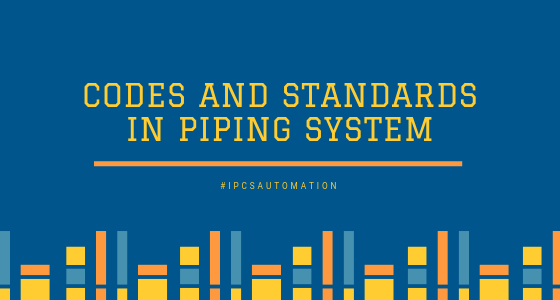
Important codes and standards in the piping system
For every Piping Systems, proper selection of Material of Construction along with all required Specifications, and Adherence to Codes and Standards is essential. Standardization reduces cost, confusion, and inconvenience. Standards are organized and published by Professional Societies, Committees, and Trade Organizations. Code is also accepted by Governments. The main objective is to have Standardization and Safety.
Piping codes and standards
The integrity of a piping system strictly based on the principles of design, construction, and maintenance of the system. The components can be made in a variety of materials, in different shapes or size. The components are manufactured according to the national standard. Some companies even publish their own internal piping standard based upon national and industrial sector standard.
Piping codes
The prerequisite of invention, fabrication, use of materials, test and inspection of pipes and piping system, etc. comes under piping codes. What you need to do is only trial and inspection of pipes and piping systems. A code can never be a low, but it can adopt into law
Piping standards
The application, design and construction rules and equirements for piping components as flanges, elbow, tees, valves, etc. together constitute the standards.
The piping codes and standards from the standardization organization are:
ANSI – American National Standard Institute
ANSI will never develop the standards by their own, this institute only oversees the development and usage of standards. The main job of ANSI is to accredit the procedures of the standard development organization to meet the requirement.
ASME -American Society for Mechanical Engineering
It is the oldest standard developing organization in America. They usually used to generate about 600 codes and standards by covering many technical areas like plumbing, fixtures, elevators pipelines, and power plant systems and components.
ISO – International Organization for Standardization
It’s an world’s largest independent non-governmental body who develops voluntary international standards and facilitate world trade by providing common standard between nation.
API – American Petroleum Institute
The API requirements are centered on oil production, refinery then production parceling services. Equipment designated after these requirements are typically greater powerful than usual technical applications.
ASTM – American Society for Testing and Material
It is an international standard organization who are assigned to develop as well as publish technical standards for a large range of materials, products, system, and services.
Here comes a conclusion that for every piping and pipeline system, coding and standardization are important. It’s the part and parcel of every pipe construction to flow the fluid in a smooth and safe manner. Come and join us, we IPCS Automation will provide you a clear cut knowledge of piping and pipeline engineering within a short span.
